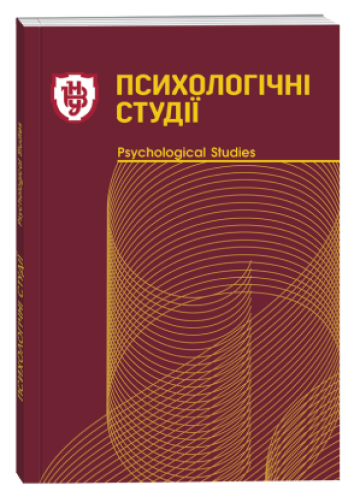PECULIARITIES OF THE RELATIONSHIP OF SELF-REGULATION OF STUDENTS WITH DIFFERENT LEVELS OF PERFECTIONISM
DOI:
https://doi.org/10.32782/psych.studies/2023.2.8Keywords:
self-regulation, perfectionism, correlation, students, levels of perfectionism.Abstract
The article presents the results of the study of the relationship of self-regulation of students with different levels of perfectionism in the conditions of military operations in Ukraine. Attention is drawn to the increased sensitivity to stress and the experiences of perfectionists, who may be particularly vulnerable to the effects of war. At the same time, it is emphasized that high self-regulation can help people with perfectionistic traits to maintain their mental health in the conditions of war. Attention is focused on the prevalence of perfectionism in modern society, so understanding the relationship between self-regulation and perfectionism can provide important aspects for providing adequate psychological and psychotherapeutic help to people who need it. The main views on perfectionism in psychology are considered: theoretical and applied. Research on self-regulation by Ukrainian scientists demonstrates sufficient diversity and covers various aspects. It is emphasized that perfectionism can have both positive and negative conse quences for a person’s mental health, and that self-regulation can be a useful strategy to prevent the negative consequences of perfectionism. It was found that perfectionism is quite common among students. In the work the levels of manifestation of perfectionism of students were determined and analyzed. Manifestations and levels of self-regulation among students were studied. Most students have low levels of selfregulation on all three scales, indicating difficulty maintaining self-control and regulating their thoughts, emotions, and behaviors. Statistically significant differences in indicators of perfectionism and self-regulation in women and men of the studied sample were analyzed. Correlations of self-regulation of students with different levels of perfectionism were studied and analyzed. Cause-and-effect relationships of perfectionism and self-regulation of students were identified and analyzed. It was established that with an increase in the level of perfectionism, the level of effectiveness of self-regulation of students decreases.
References
Бойко І.О., Петренко І.О. Саморегуляція особистості як процес, фактор і результат діяльності. Київ : Ліра, 2016. 336 с.
Бочковська І.Є. Формування навичок саморегуляції як умова підвищення ефективності навчання студентів. Науковий вісник Національного університету біоресурсів і природокористування України. Серія: Педагогіка, психологія, філософія. № 1(39), 2018, с. 37–44.
Ганжа І.В., Спринченко О.В., Шалагінова О.В. Особливості формування саморегуляції особистості : монографія. Видавництво «Тернопільський національний технічний університет імені Івана Пулюя». 2017 рік. С. 257.
Горошко Н.М., П’ятак Н.М. Взаємозв’язок саморегуляції, перфекціонізму та життєвого задоволення у студентів. Педагогіка і психологія. 2019. № 2. С. 67–75.
Завгородня О.О., Ільїна М.В. Концептуалізація перфекціонізму в психології: сучасні теоретичні підходи та ретроспективний аналіз. Наукові записки Національного університету «Острозька академія». Серія «Психологія», № 5(47), 2019. С. 86–90.
Коваль І.І., Коваль Л.І. Перфекціонізм як психологічний феномен: проблеми дослідження, діагностики та корекції. Львів : Видавництво Львівської політехніки. 2017. С. 234.
Кондратенко А.А. Взаємозв’язок стресостійкості та саморегуляції у першокурсників. Освітологічний дискурс, № 2(2). 2020, с. 130–141.







